2015 Neighborhood Food Hubs
Meet the 2015 Hubs
DANBY
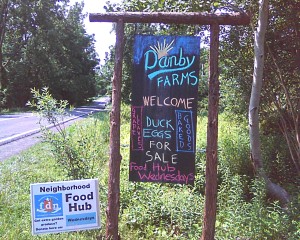
(Image: Jeanine Huber)
Danby Farms, 222 Bald Hill Rd
Wednesdays, 8 a.m.–8 p.m.
Hub holder: Jeanine Huber
“Volunteering has always been a part of my life,” says Huber, whose parents and grandfather were involved with assisting food pantries.
“When I started gardening, I couldn’t find a place where I could sporadically donate a small amount of fresh food,” she says. “Most food pantries won’t take it.”
Last year, after reading about FDN’s pilot Neighborhood Food Hub program, she got involved as a hub helper. This year, she is hosting a hub in front of her house in Danby.
“Whatever is in the garden or community-supported agriculture share in a given week is what gets donated—eggs, greens, green beans, summer squash, berries, tomatoes, peppers, eggplants, apples, winter squash, and more,” Huber says. “The in-season donations are fresher than what you’ll find at the grocery store, and are distributed the day after collection.”
The food goes directly to the Danby Food Pantry or, on weeks when the pantry is not held, to FDN’s walk-in refrigerator, from which it is redirected to other local pantries.
“Hungry people get a healthy meal, and we gardeners are not wasting what the earth has provided,” Huber says.
DRYDEN
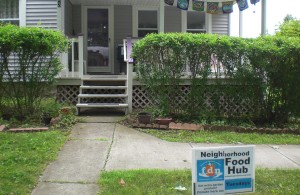
Many Neighborhood Food Hubs—like this one in front of Fay Bunnell’s home at 33 James Street in Dryden—are hosted by individuals who are passionate about food justice. (Image: Fay Bunnell)
33 James St
Sundays, 7 a.m.–7 p.m.
Hub holder: Fay Bunnell
“I got involved because I wanted to help expand FDN’s Neighborhood Food Hub program to outlying areas such as Dryden, where I live,” says Bunnell. “Having a hub in front of my house means that both Dryden’s Methodist and Presbyterian food pantries can be given fresh food to add to the distributions for the local families,” she says. “I feel great about playing any part I can in getting healthy, fresh food to folks to enjoy.”
Getting involved has also been a very positive experience, Bunnell says. “I have never worked with a more congenial, supportive group than the FDN community of volunteers.”
GROTON
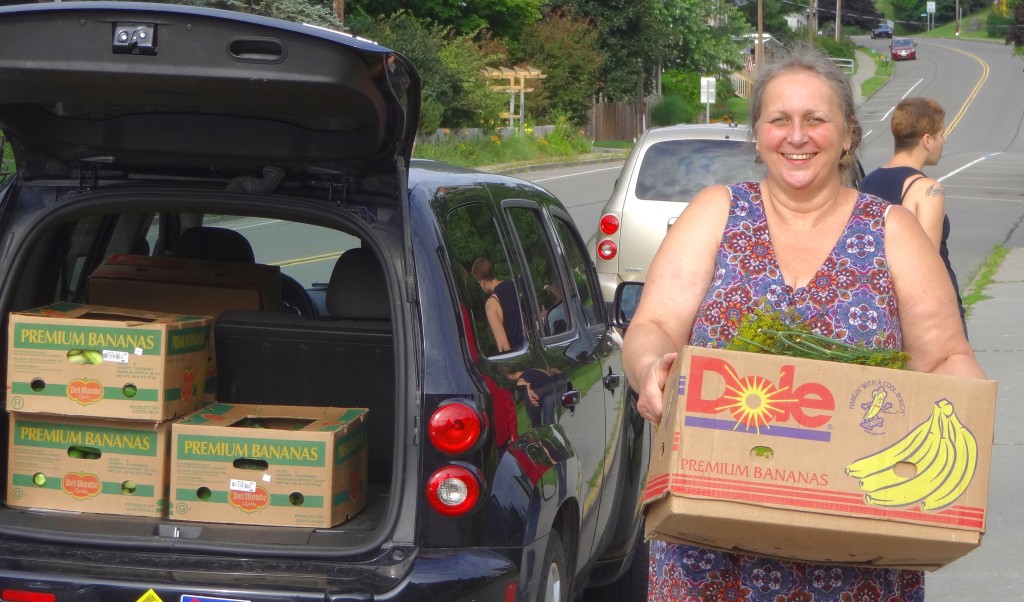
Volunteer Ruth Williams unloads donated boxes of fruits and vegetables for “Healthy Tuesdays” at the Groton Public Library. (Image: Sara Knobel)
Groton Public Library, 112 E. Cortland St
Tuesdays, 10 a.m.–9 p.m. (drop-offs and pick-ups welcome throughout the week)
Hub holders: Sara Knobel and Ruth Williams
Groton is at risk of becoming “a food desert,” says Sara Knobel, manager of the Groton Public Library. “There’s just a 7-Eleven and a dollar store.”
Many residents—particularly the elderly—do not have much access to healthy, fresh food, says Knobel. Many can’t afford cars, and public transportation isn’t cheap and doesn’t run often or stop at farm stands that sell fresh produce.
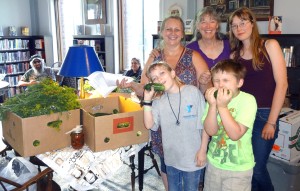
Back row, left to right: Ruth Williams, FDN volunteer; Mary McGarry Newman, co-owner of Buried Treasure; Mary’s daughter, Rachel Front row: Ruth’s grandson, Braedy (right) and a young helper and beneficiary (left) at the Groton Public Library’s “Healthy Tuesdays” food pantry. (Image: Sara Knobel)
To remedy the situation, Knobel approached a couple who visited the library often and also ran an organic community-supported agriculture program called Buried Treasure. Knobel arranged for the couple to donate their surplus fruits and vegetables to a food pantry at the library on what Knobel dubs “Healthy Tuesdays.”
The library became a Neighborhood Food Hub during the summer as well as an official food pantry recipient throughout the year.
Its clients also benefit from whatever’s ready for picking in a communal garden that Groton community members started on village property, according to Knobel. “I love introducing people to something they haven’t had before, such as squashes and garlic scapes,” she says. The fresh food not only “offsets hunger, but also improves people’s diets.”
“Four older women from senior housing come every week [for the free produce],” Knobel says. “One woman took my hand and said, ‘God bless you. It makes such a difference.’”
ITHACA
222 E. Falls St
Thursdays, 8 a.m.–8 p.m.
Hub holder: Mike Charnoky
“I’m a board member and on FDN’s public relations committee and had been helping with its IT function and website,” says Charnoky. “I became a hub holder because I thought it was a tangible, hands-on way to help with a core cause. I got about 18 pounds of food donated the first week, a nice mix of salad greens and a lot of kale,” he reports.
“Hubs make it easy for people to donate food and get it to where it’s needed most,” he says. “But the thing that really strikes me about them is the positive reactions from everyone in the neighborhood and community. People love the idea, and it seems to inspire them. I’ve been told, ‘Wow, what a great idea. What a simple and easy way to donate surplus food from our garden.’ It is just one small step, but a very visible sign of people working together to do something good.”
Ithaca Community Gardens, Carpenter Cir
Wednesdays and Sundays, 9 a.m.–6:30 p.m.
Hub holder: Judith Barker and Liz Burns
Judith Barker, board president of Ithaca Community Gardens (ICG), says ICG got involved with FDN’s Neighborhood Food Hub program because members were “tired of seeing unpicked vegetables and fruits rot on the vine every August and September.”
“It’s outrageous that we throw food away while people go hungry in this land of plenty,” Barker says.
ICG’s current location at Carpenter Park near the Ithaca Farmers Market consists of 150 plots, each 280 square feet, maintained by an equal number of gardeners. Three plots are set aside just for food donations.
The gardeners, who rent the land from the city for $1 a year, plant a large variety of fruits and vegetables, including ones from places as far as Burma and Vietnam.
“Food justice is in ICG’s interest because we all grow and enjoy food,” Barker says. “Everybody has a right to healthy, nutritious, local, sustainable food.”
Southside Community Center, 305 S. Plain St
Fridays, 10 a.m.–8 p.m.
Hub holders: Charles Rhody and Sue Robinson
The best part about being a Friendship Donations Network (FDN) “hub holder,” according to Charles Rhody, nutrition and fitness coordinator at Southside, is “putting healthy food on the plates of the families we serve—kale and other fresh vegetables and fruits.” A diet enriched by such foods “can help people prevent illnesses such as diabetes and eliminate toxins from their bodies,” he says.
How does the program work? “Every Friday, the people who run the stand contribute to the FDN food hub any fresh food that doesn’t get sold, and people who purchase produce from the stand often buy a little extra and put it in the cooler,” Rhody explains.
Every fourth Friday, all the food collected goes directly to Southside’s food pantry, which gives the food away the next day to community members in need. Rhody and others also collect and donate produce from Beverly J. Martin Elementary School’s garden.
“It’s great that we can now offer fresh fruits and vegetables, which our pantry clients normally can’t afford,” says Rhody.
On the other three Fridays, a “hub helper” brings the collected food to a walk-in cooler at FDN’s headquarters at the Just Be Cause Center in Ithaca, where volunteers redistribute it to other local food pantries.
Improving people’s overall health is one reason Southside became involved with FDN’s food hubs, says Rhody.
“It’s a great program,” he says. “It would be even greater if it expanded to other places so that families in need throughout our area could have fresh fruits and vegetables every day and have long and healthy lives.”
Ithaca Children’s Garden, Cass Park Access Rd
Wednesdays, 9:30 a.m.–6:30 p.m.
Hub holder: TBA
Profile coming soon!
EcoVillage at Ithaca, 100 Rachel Carson Way
Tuesday, 8 a.m.–8 p.m.
Hub holder: Marty Hiller
Profile coming soon!
Breckenridge Place, W. Seneca St
Sundays, 2–4 p.m.; Mondays, 12–4 p.m.
Hub holder: TBA
Profile coming soon!
First Congregational Church, 309 Highland Rd
Sundays, 9 a.m.–12 p.m.
Hub holder: Ken Finkelstein and FCC Outreach Committee
Profile coming soon!
411 N. Cayuga St
Saturdays, 8 a.m.–8 p.m.
Hub holder: Carol Ann Brust
“Several years ago, I volunteered one Sunday to do some food pickup for FDN from Wegmans, Tops, and GreenStar markets. That turned into another Sunday, then another, and another. So when FDN was looking to start its Neighborhood Food Hub program, I volunteered my front yard, as it is on one of the main roads and is an easy spot for a drop-off. I’ve gotten donations this summer of kale, lettuce, squash, tomatoes, cucumbers, apples, peaches, pears, and more.
I get to see first-hand what it means to my community, as I also do deliveries to local food pantries every other Sunday. As the prices for fresh produce go up and people’s incomes don’t, these fresh food donations help out tremendously. Everyone is so very grateful for it. The kids come running and will eat some of the fruit as they are putting them into their bags to take home.
I’m grateful to be able to do my small part in helping out. If more people would just get involved by donating just an hour a week of their time, we could help get rid of hunger within our own community.”
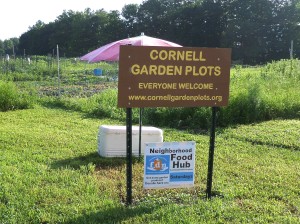
(Image: Patricia Bax)
Cornell Garden Plots, Freese Rd, between Hanshaw and Dryden Rds
Saturdays, 8 a.m.–8 p.m.
“Cornell Garden Plots is a small volunteer association of about 79 local gardeners,” explains Patricia Bax. “Cornell makes the land available to us, but anyone with an interest in gardening can join. No affiliation to Cornell is needed.” (For more information, visit www.cornellgardenplots.org).
“Last year, when FDN started its Neighborhood Food Hub program, all the hubs were in the city of Ithaca, which I found inconvenient,” she says. “I suggested having a hub right where we garden.”
“In the past, a lot of what we grew ended up in our compost piles,” Bax says. “If instead we donate to FDN what we don’t need by putting it in its food hub cooler, we know it’s going to the tables of people who really need it. We have the easy part: all we have to do is collect the food and bring it to FDN.”
Cornell University Plant Science Building, Tower Rd
Mondays, 8 a.m.–5 p.m.
Hub holder: Jane Mt. Pleasant
“I’m a longtime FDN volunteer and board member,” says Mt. Pleasant. “Many Cornell employees and students, particularly those in the College of Agriculture and Life Sciences where I work, are passionate and committed to food and agriculture issues at all levels and scales. We love plants and landscapes, love having gardens, and we want to find meaningful and effective ways to improve the food system, both professionally and personally.”
“The place where I work, Cornell’s Plant Science building, has many home gardeners, and many are finding it convenient to bring extra veggies to work with them on Monday mornings and deposit them in one of our Neighborhood Food Hub coolers. Later that day, I collect them and bring them to FDN,” she says.
“Donating food from our gardens to those who need it most is one small way we can combine our passions, knowledge, and desire to engage and support the wider community.”
LODI
Lodi Whittier Library, 2155 E. Seneca St
Fridays, 8 a.m.–8 p.m.; Saturdays, 8 a.m.–12 p.m.
Hub holder: TBA
Profile coming soon!
NEWFIELD
Newfield United Methodist Church, 229 Main St
Wednesdays, 8 a.m.–6 p.m.
Hub holder: Marge Strosnider, and others
“As a Newfield Food Pantry coordinator, I am always looking for ways to get fresh produce to our pantry families,” says Strosnider.
“Our former high school principal, Barry Derfel, encouraged our Newfield community to work together to help eliminate hunger,” she says. “He coordinated with our high-school earth science teacher, Andrew Battles, and Steve Yaple, district maintenance supervisor, to build raised beds in the high-school courtyard, where students planted a vegetable garden early this spring.” Third-grade teachers and their students also planted a vegetable garden in front of the school, she says.
Other volunteers weeded, watered, harvested, and delivered early crops to Newfield’s food pantry at Newfield United Methodist Church, Strosnider says. “Jean Gerow, a community volunteer, worked with students in the summer day camp program to help harvest and care for the gardens, too,” she says.
The project to involve Newfield in FDN’s Neighborhood Food Hub program began when Joanne James, business administrator at Newfield Central School, organized a meeting at Freddie’s restaurant of “people connected to our gardens and who help distribute food in the community,” Strosnider says.
As a result, two Neighborhood Food Hubs are now available for Newfield community donations every Tuesday and Wednesday this summer and fall.
“By setting a Neighborhood Food Hub cooler by the school and encouraging students to donate surplus food from their gardens, we can help them learn about ways to alleviate hunger in our own community,” says James.
Donations go directly to the Newfield Kitchen Cupboard for distribution at regular food pantries at the church, a monthly Mobile Truck Pantry of the Food Bank of the Southern Tier, and the free Community Dinners held the fourth Monday of each month at the church.
“This is a wonderful, cooperative effort to give families in the Newfield community more healthy, fresh food choices,” she says. “And local residents who have their own gardens will look forward to having a place to share their excess produce.”
Article by Linda Brandt Myers
Edited by Meaghan Sheehan Rosen and Owen Zhang
Layout by Owen Zhang
